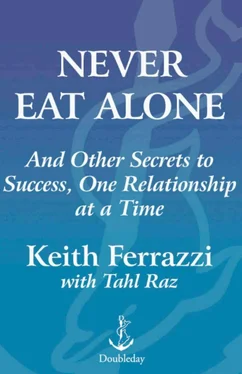Keith Ferrazzi - Never Eat Alone
Здесь есть возможность читать онлайн «Keith Ferrazzi - Never Eat Alone» весь текст электронной книги совершенно бесплатно (целиком полную версию без сокращений). В некоторых случаях можно слушать аудио, скачать через торрент в формате fb2 и присутствует краткое содержание. Год выпуска: 2005, ISBN: 2005, Издательство: C U R R E N C Y • D O U B L E D A Y, Жанр: marketing, на английском языке. Описание произведения, (предисловие) а так же отзывы посетителей доступны на портале библиотеки ЛибКат.
- Название:Never Eat Alone
- Автор:
- Издательство:C U R R E N C Y • D O U B L E D A Y
- Жанр:
- Год:2005
- ISBN:0-385-51529-4
- Рейтинг книги:4 / 5. Голосов: 1
-
Избранное:Добавить в избранное
- Отзывы:
-
Ваша оценка:
- 80
- 1
- 2
- 3
- 4
- 5
Never Eat Alone: краткое содержание, описание и аннотация
Предлагаем к чтению аннотацию, описание, краткое содержание или предисловие (зависит от того, что написал сам автор книги «Never Eat Alone»). Если вы не нашли необходимую информацию о книге — напишите в комментариях, мы постараемся отыскать её.
Never Eat Alone — читать онлайн бесплатно полную книгу (весь текст) целиком
Ниже представлен текст книги, разбитый по страницам. Система сохранения места последней прочитанной страницы, позволяет с удобством читать онлайн бесплатно книгу «Never Eat Alone», без необходимости каждый раз заново искать на чём Вы остановились. Поставьте закладку, и сможете в любой момент перейти на страницу, на которой закончили чтение.
Интервал:
Закладка:
Here are some of the rules I follow fleshed out in more detail:
1. Draft off a reference.
The reason a cold call feels like torture was set out in vivid detail fifty or so years ago in an advertisement, recalled by Harvey Macka, in his book Swim with the Sharks. It pictures a corporate killjoy facing the reader, who is cast in the role of the salesman. The killjoy says:
I don't know who you are.
I don't know your company.
I don't know what your company stands for. I don't know your company's customers.
I don't know you company's products.
I don't know your company's reputation. Now—what was it you wanted to sell me?
You can see the total lack of credibility one has when making a cold call. Credibility is the first thing you want to establish in any interaction, and ultimately, no one will buy from you unless you establish trust. Having a mutual friend or even acquaintance will immediately make you stand out from the other anonymous individuals vying for a piece of someone's time.
What do I mean by that? If you are calling on behalf of the president, I guarantee you Mr. Killjoy on the other end of the line will listen to what you have to say. Drafting off the brands of others, whether personal references or organizations, is a helpful tactic to get past someone's initial reluctance.
Most of us, however, don't work for Microsoft or know the president of the organization we're trying to reach out to. Our task, then, is to tap our network of friends, family, clients, neighbors, classmates, associates, and church members to find a path back to the person we're trying to reach. When you mention someone both of you have in common, all of a sudden the person you're calling has an obligation not only to you but also to the friend or associate you just mentioned.
Today, finding a line into someone's office is a lot easier than when I started out.
Again, the wonderfully effective search engine Google.com is nearly invaluable in this process. Do a name search and you'll likely find where a person went to school, what his or her interests are, and what boards he or she sits on—you'll get a perspective on the person's life that should give you ideas on where a mutual contact might be found. What sports do they play? What nonprofits do they care about? Do you know other people involved in similar causes?
A whole host of new companies, like Spoke and Linkedln, specialize in helping you find connections to people you want to get in touch with. A company called Capital IQ aggregates market data and information on executives, for example, to make it very easy to find out whom they know that you know. Other companies, like Friendster, Ryze, and ZeroDegrees, help to broker connections inside and outside of companies around the world. Some of these networks are better for finding a date, so you'll have to see for yourself which one makes more sense for you.
People used to say there were only six degrees of separation between anyone in the world. Today, we're only one or two mouse clicks away.
2. State your value.
Acquiring a reference or institution to draft off of is only a starting point. It will help you get your foot in the door. Once you have someone's commitment to hear you out for thirty seconds, you'll need to be prepared to deliver a high-value proposition. You've got very little time to articulate why that person should not try to get off the phone as quickly as possible. Remember, it's all about them. What can you do for them?
When researching for a connection to the people you want to meet, first do some reconnaissance about the company and industry they're selling in. Selling is, reduced to its essence, solving another person's problems. And you can only do that when you know what those problems are. When I finally got a chance to talk with Serge, for instance, I already knew he was preparing to launch some new products in the upcoming quarter, and in the busy holiday season he was going to need something that would really stand out. I also knew his target audience aligned well with those going to the theaters.
I can cut through the clutter of other cold calls by personalizing my call with specific information that shows I'm interested enough in their success to have done some homework.
3. Talk a little, say a lot. Make it quick, convenient, and definitive.
You want to impart both a sense of urgency and a sense of convenience. Instead of closing with "We should get together some time soon," I like to finalize with something like "I'm going to be in town next week. How about lunch on Tuesday? I know this is going to be important for both of us, so I'll make time no matter what."
You will, of course, need to provide enough information about your value proposition to make the person want to spend some time talking. But also, don't talk too much. If you launch into a long sales pitch without finding out the other person's thoughts, you can turn them off immediately. It is a dialogue, not a scripted monologue. Even my fifteen-second intro above left time for the casual "ah huh, yes" or "hmm" from the other person. Don't ever talk at someone. Give them time to come along with you.
Remember, in most instances, the sole objective of the cold call is, ultimately, to get an appointment where you can discuss the proposition in more detail, not to close the sale. In my experience, deals, like friendships, are made only one-to-one, face-to-face. Take as little time as possible in your cold call to ensure that the next time you speak to them it's in their office, or better yet, over some linguine and wine.
4. Offer a compromise.
In any informal negotiation, you go big at the outset, leaving room for compromise and the ability to ratchet down for an easier close. I closed my pitch to Serge by suggesting that even if he didn't want to hear anything about digital content, I'd love to get together with him just to meet, given our mutual friend's admiration and respect.
Robert B. Cialdini's book The Psychology of Persuasion shows how compromise is a powerful force in human relations. An example used to illustrate this idea concerns Boy Scouts, who are often turned down initially when trying to sell raffle tickets. It has been statistically shown, however, that when the Scout then offers candy bars instead, a less costly item, customers will buy the candy even if they don't really want it. In giving in to the concession, people feel as if they're holding up their social obligation to others. So remember, try for a lot—it will help you settle for what it is you really need.
10. Managing the Gatekeeper
Let's face it, having a list of names of people you want to reach in business, and a plan for what to say to them when you've got them on the phone, doesn't mean much if you never get them on the phone. Half the difficulty in reaching out to others is actually reaching somebody at all. It's even more difficult when that somebody is a Big Kahuna with a thicket of protective voice mailboxes, blind e-mail addresses, and defensive assistants running interference.
So how do you open the door?
First, make the gatekeeper an ally rather than an adversary. And never, ever get on his or her bad side. Many executive assistants are their bosses' minority partners. Don't think of them as "secretaries" or as "assistants." In fact, they are associates and lifelines.
Every time I have ever tried to go head-to-head with an administrative assistant, I've lost. It's like that childhood game: rock, paper, scissors. Well, in this game, as Mary Abdo taught me, the "associate" trumps all.
Mary was the assistant to Pat Loconto, the CEO of Deloitte (and I guess still is, even though Pat is retired), and in the beginning, we got along great. I remember once finishing up a dinner with Pat and Mary. Mary had to leave early, so I walked her outside while she got a taxi. The next day, I called to say thanks for arranging such a wonderful evening.
Читать дальшеИнтервал:
Закладка:
Похожие книги на «Never Eat Alone»
Представляем Вашему вниманию похожие книги на «Never Eat Alone» списком для выбора. Мы отобрали схожую по названию и смыслу литературу в надежде предоставить читателям больше вариантов отыскать новые, интересные, ещё непрочитанные произведения.
Обсуждение, отзывы о книге «Never Eat Alone» и просто собственные мнения читателей. Оставьте ваши комментарии, напишите, что Вы думаете о произведении, его смысле или главных героях. Укажите что конкретно понравилось, а что нет, и почему Вы так считаете.












